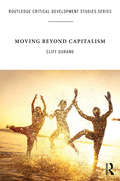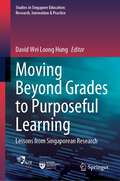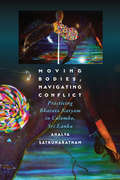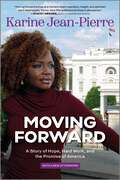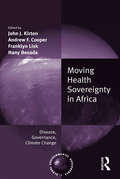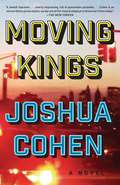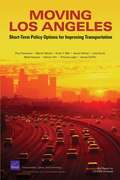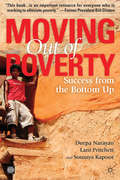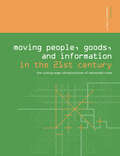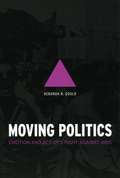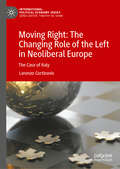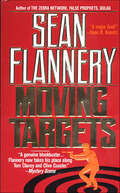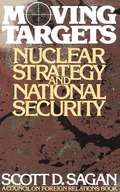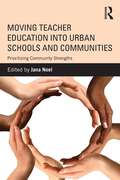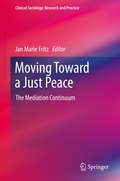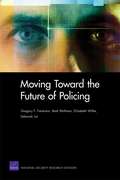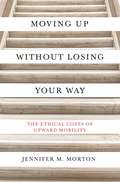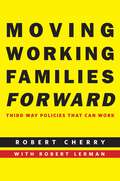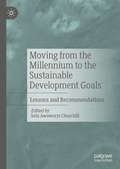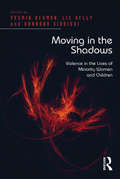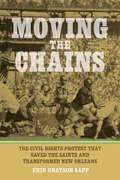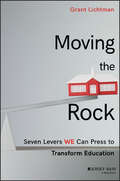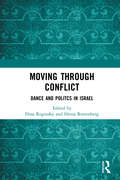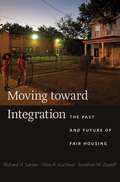- Table View
- List View
Moving Beyond Capitalism (Routledge Critical Development Studies)
by Cliff DuRandThe book speaks to the widespread quest for concrete alternative ways forward 'beyond capitalism' in the face of the prevailing corporatocracy and a capitalist system in crisis. It examines a number of institutions and practices now being built in the nooks and crannies of present societies and that point beyond capitalism toward a more equal, participatory, and democratic society – institutions such as cooperatives, public banks, the commons, economic democracy. This seminal collection of critical studies draws on academic and activist voices from the U.S. and Canada, Mexico, Cuba, and Argentina, and from a variety of theoretical-political perspectives – Marxism, anarchism, feminism, and Zapatismo.
Moving Beyond Grades to Purposeful Learning: Lessons from Singaporean Research (Studies in Singapore Education: Research, Innovation & Practice #5)
by David Wei Loong HungThis book explores future directions in Singaporean education as it moves beyond its historically formative goals of survival, efficiency and performance, and its emphasis on grades and formal credentialing. It examines the future of education via the 4Life framework, a four-form model for purposeful learning centered around social-emotional regulation and the well-being of the individual learner: Life-long learning, the learning that occurs over a learner's lifespan; Life-deep learning, a deep understanding of learned content and adaptive expertise; Life-wide learning, learning in multiple contexts besides the school environment; and Life-wise learning, learning which focuses on the learner's values, morals, character and historical empathy. This book also illustrates how purposeful learning serves to equip learners with the knowledge, skills, dispositions and competencies they need to thrive as adaptive workers in the economy of the future.
Moving Bodies, Navigating Conflict: Practicing Bharata Natyam in Colombo, Sri Lanka
by Ahalya SatkunaratnamMoving Bodies, Navigating Conflict is a groundbreaking ethnographic examination of dance practice in Colombo, Sri Lanka, during the civil war (1983–2009). It is the first book of scholarship on bharata natyam (a classical dance originating in India) in Sri Lanka, and the first on the role of this dance in the country's war. Focusing on women dancers, Ahalya Satkunaratnam shows how they navigated conditions of conflict and a neoliberal, global economy, resisted nationalism and militarism, and advocated for peace. Her interdisciplinary methodology combines historical analysis, methods of dance studies, and dance ethnography.
Moving Forward: A Story of Hope, Hard Work, and the Promise of America
by Karine Jean-Pierre&“Moving Forward arrives at a moment when inspiration, insight, and optimism are in short supply. Karine Jean-Pierre delivers all three in abundance.&” —Stacey Abrams, author of Lead from the Outside&“Karine Jean-Pierre illuminates her path to insider status so others can follow in her footsteps.&”—Essence&“Jean-Pierre inspires us to get involved in politics—every single one of us, no matter where we are from or who we are.&”—The AtlanticMost political origin stories have the same backbone. A bright young person starts reading the Washington Post in elementary school. She skips school to see a presidential candidate. In middle school she canvasses door-to-door. The story can be intimidating. It reinforces the feeling that politics is a closed system: if you weren&’t participating in debate club, the Young Democrats and Model UN you have no chance.Karine Jean-Pierre&’s story breaks the mold. In Moving Forward, she tells how she got involved, showing how politics can be accessible to anyone, no matter their background. In today&’s political climate, the need for all of us to participate has never been more crucial. This book is her call to arms for those who know that now is the time for us to act.
Moving Health Sovereignty in Africa: Disease, Governance, Climate Change (Global Environmental Governance)
by Hany Besada Andrew F. CooperToday’s era of intense globalization has unleashed dynamic movements of people, pathogens, and pests that overwhelm the static territorial jurisdictions on which the governance provided by sovereign states and their formal intergovernmental institutions is based. This world of movement calls for new ideas and institutions to govern people’s health, above all in Africa, where the movements and health challenges are the most acute. This book insightfully explores these challenges in ways that put the perspectives of Africans themselves at centre stage. It begins with the long central and still compelling African health challenge of combating the pandemic of HIV/AIDS. It then examines the global governance responses by the major multilateral organizations of the World Bank and the World Trade Organization and the newer informal flexible democratically oriented ones of the Group of Eight. It also addresses the compounding health challenge created by climate change to assess both its intensifying impact on Africa and how all international institutions have largely failed to link climate and health in their governance response. It concludes with several recommendations about the innovative ideas and institutions that offer a way to closing the great global governance gaps and thus improving Africans’ health and that of citizens beyond.
Moving Kings: A Novel
by Joshua CohenA propulsive, incendiary novel about faith, race, class, and what it means to have a home, from Joshua Cohen, “a major American writer” (The New York Times) One of the boldest voices of his generation, Joshua Cohen returns with Moving Kings, a powerful and provocative novel that interweaves, in profoundly intimate terms, the housing crisis in America’s poor black and Hispanic neighborhoods with the world's oldest conflict, in the Middle East. The year is 2015, and twenty-one-year-olds Yoav and Uri, veterans of the last Gaza War, have just completed their compulsory military service in the Israel Defense Forces. In keeping with national tradition, they take a year off for rest, recovery, and travel. They come to New York City and begin working for Yoav’s distant cousin David King—a proud American patriot, Republican, and Jew, and the recently divorced proprietor of King’s Moving Inc., a heavyweight in the tri-state area’s moving and storage industries. Yoav and Uri now must struggle to become reacquainted with civilian life, but it’s not easy to move beyond their traumatic pasts when their days are spent kicking down doors as eviction-movers in the ungentrified corners of the Bronx, Brooklyn, and Queens, throwing out delinquent tenants and seizing their possessions. And what starts off as a profitable if eerily familiar job—an “Occupation”—quickly turns violent when they encounter one homeowner seeking revenge. Praise for Moving Kings“Brilliant . . . master-planned to slowly unsettle your convictions, as the best novels do . . . Cohen has a brain-on-fire intellect and a Balzac-grade enthusiasm for understanding varieties of experience.”—Los Angeles Times “A svelte comic triumph that concentrates [Cohen’s] genius . . . a fantastically agile style . . . Cohen explores themes of power and Jewish identity with the same insight that has justly attracted praise from some of the country’s most sophisticated writers.”—The Washington Post“This lively story of the fraught ties that bind an American, Republican Jew and his Israeli family makes another strong case for Cohen’s admission into the ranks of the Great American Novelists.”—Esquire “Joshua Cohen’s Moving Kings is a lit fuse, a force let loose, a creeping flame heading for demolition, and Cohen himself is a fierce polyknower in command of the moving parts of the human predicament.”—Cynthia Ozick
Moving Los Angeles: Short-term Policy Options for Improving Transportation
by Endy Y. Min Martin Wachs Liisa Ecola Paul Sorensen Aaron KofnerLos Angeles has the worst traffic congestion in the country. Excessive traffic congestion detracts from quality of life, is economically wasteful and environmentally damaging, and exacerbates social-justice concerns. The authors of this book recommend strategies for reducing congestion in Los Angeles County that could be implemented and produce significant improvements within about five years.
Moving Matters: Paths of Serial Migration
by Susan OssmanMoving Mattersis a richly nuanced portrait of the serial migrant: a person who has lived in several countries, calling each one at some point "home. " The stories told here are both extraordinary and increasingly common. Serial migrants rarely travel freely—they must negotiate a world of territorial borders and legal restrictions—yet as they move from one country to another, they can use border-crossings as moments of self-clarification. They often become masters of settlement as they turn each country into a life chapter. Susan Ossman follows this diverse and growing population not only to understand how paths of serial movement produce certain ways of life, but also to illuminate an ongoing tension between global fluidity and the power of nation-states. Ultimately, her lyrical reflection on migration and social diversity offers an illustration of how taking mobility as a starting point fundamentally alters our understanding of subjectivity, politics, and social life.
Moving Out of Poverty: Success from the Bottom Up
by Deepa Narayan Soumya Kapoor Lant Pritchett'No matter if I fall, I get up again. If I fall 5,000 times, I will stand up another 5,000 times.' -- William, a 37-year-old from El Gorrión, Colombia. Why and how do some people move out of poverty--and stay out--while others remain trapped? Most books on growth and poverty reduction are dominated by the perspectives of policy makers and academic experts. In contrast, 'Moving Out of Poverty: Success from the Bottom Up' presents the experiences of poor people who have made it out of poverty. The book's findings draw from the Moving Out of Poverty research conducted in communities in 15 countries in Africa, East Asia, Latin America, and South Asia. The authors synthesize the results of qualitative and quantitative research based on discussions with over 60,000 people in rural areas. They offer bottom-up perspectives on the processes and local institutions that play key roles in escapes from poverty. The study finds that there are no differences in the initiatives taken by the poor, the rich, and the upwardly mobile. What, then, explains the difference in outcomes? The authors demonstrate how-in the face of deep social inequalities that block access to economic opportunities and local democracies-individual initiative and empowerment by themselves are often not enough to escape poverty. This book will be of interest to all concerned with equity in an increasingly unequal world.
Moving People, Goods and Information in the 21st Century: The Cutting-Edge Infrastructures of Networked Cities (Networked Cities Series)
by Richard E HanleyGlobalisation and technological innovation have changed the way people, goods, and information move through and about cities. To remain, or become, economically and environmentally sustainable, cities and their regions must adapt to these changes by creating cutting-edge infrastructures that integrate advanced technologies, communications, and multiple modes of transportation. The book defines cutting-edge infrastructures, details their importance to cities and their regions, and addresses the obstacles to creating those infrastructures.
Moving Politics: Emotion and ACT UP's Fight Against AIDS
by Deborah B. GouldIn the late 1980s, after a decade spent engaged in more routine interest-group politics, thousands of lesbians and gay men responded to the AIDS crisis by defiantly and dramatically taking to the streets. But by the early 1990s, the organization they founded, ACT UP, was no more--even as the AIDS epidemic raged on. Weaving together interviews with activists, extensive research, and reflections on the author's time as a member of the organization, Moving Politics is the first book to chronicle the rise and fall of ACT UP, highlighting a key factor in its trajectory: emotion. Surprisingly overlooked by many scholars of social movements, emotion, Gould argues, plays a fundamental role in political activism. From anger to hope, pride to shame, and solidarity to despair, feelings played a significant part in ACT UP's provocative style of protest, which included raucous demonstrations, die-ins, and other kinds of street theater. Detailing the movement's public triumphs and private setbacks, Moving Politics is the definitive account of ACT UP's origin, development, and decline as well as a searching look at the role of emotion in contentious politics.
Moving Right: The Case of Italy (International Political Economy Series)
by Lorenzo CortinovisThis book explores neoliberalism&’s emergence as a global ideology, contextualizing its rise within the broader capitalist restructuring that followed the decline of the Keynesian state. Understanding the ideological dimension is challenging due to the difficulties in defining it and tracing its connections across domestic, European, and global contexts. The book aims to address this complexity by examining a case of the Italian left, analyzing the labor and education policies of the Prodi (1996) and Renzi (2013) governments. This is made possible through interviews with politicians, journalists, and trade unionists. Within this transformation, Renzi&’s era symbolized the final victory of neoliberal culture over the political culture(s) that had animated the left until that point. The future of the left will depend on its ability to reckon with this legacy and to recover an independent vision capable of countering the growth of nationalist right-wing movements in Europe and globally.
Moving Targets
by Sean Flannery“A genuine blockbuster . . . With this novel, Sean Flannery takes his rightful place along such masters as Tom Clancy and Clive Cussler.” —Ed Gorman, Mystery SceneThe Cold War is over—followed by a deadlier menace than the world has ever known. Its codename: Operation Homeward Bound. Deep within the KGB, a dedicated fraternity conspires to restore the power of its fragmented homeland. Brutal, power-crazed, ruthlessly efficient, these renegade agents want nothing less than the destruction of the US.To insure its mission, this sinister coterie will use every weapon available. Torture. Murder. Even the family of a US security adviser.“Not only do Flannery’s spy thrillers have the ring of truth; sometimes they become the truth. Let’s hope Moving Targets remains fiction.” —Dean Ing, New York Times–bestselling author“Full of intriguing, fully drawn characters from both sides of the old cold war . . . [A] clever and thoroughly believable painting of interagency warfare, diverted loyalties, and political confusion in our time. Quite good.” —Kirkus Reviews
Moving Targets: Nuclear Strategy and National Security
by Scott Douglas SaganIn what Stanley Hoffmann, writing in The New York Review of Books, has called a "fine analysis and critique of American targeting policies," Sagan looks more at the operational side of nuclear strategy than previous analysts have done, seeking to bridge the gap between theory and practice.
Moving Teacher Education into Urban Schools and Communities: Prioritizing Community Strengths
by Jana NoelWinner of the 2013 American Educational Studies Association's Critics Choice Award! When teacher education is located on a university campus, set apart from urban schools and communities, it is easy to overlook the realities and challenges communities face as they struggle toward social, economic, cultural, and racial justice. This book describes how teacher education can become a meaningful part of this work, by re-positioning programs directly into urban schools and communities. Situating their work within the theoretical framework of prioritizing community strengths, each set of authors provides a detailed and nuanced description of a teacher education program re-positioned within an urban school or community. Authors describe the process of developing such a relationship, how the university, school, and community became integrated partners in the program, and the impact on participants. As university-based teacher education has come under increased scrutiny for lack of "real world" relevance, this book showcases programs that have successfully navigated the travails of shifting their base directly into urban schools and communities, with evidence of positive outcomes for all involved.
Moving Toward a Just Peace
by Jan Marie FritzMediation, the facilitated discussion of disputes and conflicts, is a flexible approach that can be used at all levels of intervention to move us toward a global peace that is both inclusive and fair. This volume, edited by Jan Marie Fritz, brings together mediators, scholar-practitioners, and a veteran diplomat to discuss the life and times of mediation in very different settings. The 14 chapters include three essays about culture, creativity, and models/theories/approaches. And there are ten chapters about practice: community mediation, mediation by police, special education mediation; interventions on behalf of widows in Nigeria; capacity-building work in Burundi; mediation in Israel; the creative facilitation of meetings; community conferencing; UN Security Council Resolution 1325 (Women and Peace and Security) and the role of civil society organizations in peacebuilding. This volume discusses the expanding roles - from prevention through societal transformation - assumed by mediators and the urgent need for mediators working at different intervention levels to learn from each other. This volume is a must read for scholars, researchers, policymakers, civil society representatives and practitioners with interests in effective dispute and conflict intervention. It particularly is recommended for those managing dispute and conflict intervention processes.
Moving Toward the Future of Policing
by Gregory F. Treverton Elizabeth Wilke Matt Wollman Deborah LaiAdvances in technology and operating concepts are driving significant changes in the day-to-day operations of future police forces. This book explores potential visions of the future of policing, based on the drivers of jurisdiction, technology, and threat, and includes concrete steps for implementation. The analysis is based on a review of policing methods and theories from the 19th century to the present day.
Moving Up without Losing Your Way: The Ethical Costs of Upward Mobility
by Jennifer MortonThe ethical and emotional tolls paid by disadvantaged college students seeking upward mobility and what educators can do to help these students flourishUpward mobility through the path of higher education has been an article of faith for generations of working-class, low-income, and immigrant college students. While we know this path usually entails financial sacrifices and hard work, very little attention has been paid to the deep personal compromises such students have to make as they enter worlds vastly different from their own. Measuring the true cost of higher education for those from disadvantaged backgrounds, Moving Up without Losing Your Way looks at the ethical dilemmas of upward mobility—the broken ties with family and friends, the severed connections with former communities, and the loss of identity—faced by students as they strive to earn a successful place in society.Drawing upon philosophy, social science, personal stories, and interviews, Jennifer Morton reframes the college experience, factoring in not just educational and career opportunities but also essential relationships with family, friends, and community. Finding that student strivers tend to give up the latter for the former, negating their sense of self, Morton seeks to reverse this course. She urges educators to empower students with a new narrative of upward mobility—one that honestly situates ethical costs in historical, social, and economic contexts and that allows students to make informed decisions for themselves.A powerful work with practical implications, Moving Up without Losing Your Way paves a hopeful road so that students might achieve social mobility while retaining their best selves.
Moving Working Families Forward: Third Way Policies That Can Work
by Robert Cherry“Cherry and Lerman have written a compelling book that challenges the orthodoxies of both the political ‘left’ and ‘right’, and that promotes a set of policies to improve the economic status of lower-to-middle income working families. All who care about the well-being of working families will learn a great deal from their analysis.”—Harry Holzer, Professor of Public Policy, Georgetown University “Offers highly sophisticated proposals for helping working families advance in the wake of welfare reform. Cherry and Lerman are very expert, and they write very well.”—Lawrence M. Mead, Professor of Politics and Public Policy, New York University Even as our political system remains deeply divided between right and left, there is a clear yearning for a more moderate third way that navigates an intermediate position to address the most pressing issues facing the United States today. Moving Working Families Forward points to a Third Way between liberals and conservatives, combining a commitment to government expenditures that enhance the incomes of working families while recognizing that concerns for program effectiveness, individual responsibility, and underutilization of market incentives are justified. Robert Cherry and Robert Lerman provide the context to understand the distinctive qualities of Third Way policies, focusing on seven areas that substantially affect working families: immigration, race and gender earnings disparities, education, housing, strengthening partnerships, and federal taxes. Balancing empirical studies with voices of working class people, they offer an important perspective on how public policies should be changed. A timely approach, Moving Working Families Forward makes policy recommendations that are both practical and transformative.
Moving from the Millennium to the Sustainable Development Goals: Lessons and Recommendations
by Sefa Awaworyi ChurchillThis book presents a collection of chapters that examine various dimensions of development. Between 2000 and 2015, the Millennium Development Goals (MDGs) remained the overarching development framework that governed the international development community. After a decade and half of commitment to the MDGs, the framework is widely considered a success, although progress reported across countries has been uneven. The new overarching international development framework may not be successful or present the best opportunities for the desired global change without a better understanding of factors that contributed the most or the least to the attainment of the MDGs. The chapters presented in this book provide discussions and insights into understanding these factors better. They represent a collection of scholarship that address some of the important questions in international development. They adopt a wide range of research methods to provide insight into what works, and what does not, in promoting the stipulated development goals.
Moving in the Shadows: Violence in the Lives of Minority Women and Children
by Liz KellyIn the UK the number of people who came from a minority ethnic group grew by 53 per cent between 1991 and 2001, from 3.0 million in 1991 to 4.6 million in 2001. Whilst much has been written about the impact of these demographic changes in relation to policy issues, black and minority women and children remain under-researched. Recent publications have tended to focus on South Asian women, forced marriage and 'honour' related violence. Moving in the Shadows brings together for the first time in a single volume, an examination of violence against women and children within the diverse communities of the UK. Its strength lies in its gendered focus as well as its understanding of the need for an integrated approach to all forms of violence against women, whilst foregrounding the experiences of minority women, the communities they are part of, and the organizations which have advocated for their rights and given them voice. The chapters contained within this volume explore a set of core themes: the forms and contexts of violence minority women experience; the continuum of violence; the role of culture and faith in the control of women and girls; the types of intervention within multi-cultural and social cohesion policies; the impacts of violence on British-born and migrant women and girls; and the intersection of race, class, gender and sexuality highlighting issues of similarity and difference. Taken together, they provide a valuable resource for scholars, students, activists, social workers and policy-makers working in the field.
Moving the Chains: The Civil Rights Protest That Saved the Saints and Transformed New Orleans
by Erin Grayson SappWe remember the 1966 birth of the New Orleans Saints as a shady quid pro quo between the NFL commissioner and a Louisiana congressman. Moving the Chains is the untold story of the athlete protest that necessitated this backroom deal, as New Orleans scrambled to respond to a very public repudiation of the racist policies that governed the city. In the decade that preceded the 1965 athlete walkout, a reactionary backlash had swept through Louisiana, bringing with it a host of new segregation laws and enough social strong-arming to quash any complaints, even from suffering sports promoters. Nationwide protests had assailed the Tulane Green Wave, the Sugar Bowl, and the AFL’s preseason stop-offs, and only legal loopholes and a lot of luck kept football alive in the city. Still, live it did, and in January 1965, locals believed they were just a week away from landing their own pro franchise. All they had to do was pack Tulane Stadium for the city’s biggest audition yet, the AFL All-Star game. Ultimately, all fifty-eight Black and white teammates walked out of the game to protest the town’s lingering segregation practices and public abuse of Black players. Following that, love of the gridiron prompted and excused something out of sync with the city’s branding: change. In less than two years, the Big Easy made enough progress to pass a blitz inspection by Black and white NFL officials and receive the long-desired expansion team.The story of the athletes whose bravery led to change quickly fell by the wayside. Locals framed desegregation efforts as proof that the town had been progressive and tolerant all along. Furthermore, when a handshake between Pete Rozelle and Hale Boggs gave America its first Super Bowl and New Orleans its own club, the city proudly clung to that version of events, never admitting the cleanup even took place. As a result, Moving the Chains is the first book to reveal the ramifications of the All-Stars’ civil resistance and to detail the Saints’ true first win.
Moving the Rock: Seven Levers WE Can Press to Transform Education
by Grant LichtmanAdvance Praise for Moving the Rock “The future comes at us fast — which means school reformers don’t have time to wait. They need real tools in real time. That’s why Moving the Rock is so important. Grant Lichtman has guidance for anyone — teachers, parents, administrators, government officials — intent on helping young people succeed not ‘someday,’ but today.” — Daniel H. Pink, best-selling author of Drive and A Whole New Mind “Grant Lichtman’s book is a clear and comprehensive guide to the “what" and the “how” of educational transformation. Organized around essential levers for change, it is a must-read for anyone who wants to make a difference in our schools.” —Tony Wagner, Harvard Ilab Expert in Residence, and best-selling author of The Global Achievement Gap and Creating Innovators” “This book gives me hope for a brighter future in education. Despite the dark clouds imposed by misguided policies, Grant Lichtman diligently tells stories of grass-roots innovations in the classrooms and schools all over the world. Moving the Rock is an inspiring call to action for all educators.”—Yong Zhao, Ph.D., Foundation Distinguished Professor, School of Education, University of Kansas “If you have children, or teach children, or want our children to succeed, this is a must-read book. Grant Lichtman throws down the challenge for all of us; that WE can change education, and he shows us just how successful schools everywhere are overcoming change-killing inertia in our schools.” —Todd Rose, best-selling author of The End of Average; Harvard University Moving the Rock: Seven Levers WE Can Press to Transform Educationgives educators, parents, administrators, students, and other stakeholders a clear paradigm for transforming our outmoded schools into schools that will help our children to meet the challenges of tomorrow. It’s no secret that our educational system is stuck. Moving the Rock shows the important roles all of us can play in un-sticking it by moving seven specific levers that will change the focus of education from what we teach to how we learn. Importantly, moving the levers is completely possible today, and in fact is already happening now in many schools. Drawing on research and extensive experience in the education community, Grant Lichtman outlines the seven essential levers that can profoundly change our schools so that we are teaching all our children how to learn, including • Creating the Demand for Better Schools • Building School-Community Learning Laboratories • Encouraging Open Access to Knowledge • Fixing How We Measure Student Success • Teaching the Teachers what They Really Need to Know • and more At the end of each of each chapter there are one or more challenges, ways that all of us can collectively turn the pioneering work of others into transformation for all our schools.
Moving through Conflict: Dance and Politcs in Israel
by Dina Roginsky Henia RottenbergMoving through Conflict: Dance and Politics in Israel is a pioneering project in examining the Israeli–Palestinian conflict through dance. It proposes a research framework for study of the social, cultural, aesthetic and political dynamics between Jews and Arabs as reflected in dance from late 19th-century Palestine to present-day Israel. Drawing on multiple disciplines, this book examines a variety of social and theatrical venues (communities, dance groups, evening classes and staged performances), dance genres (folk dancing, social dancing and theatrical dancing) and different cultural identities (Israeli, Palestinian and American). Underlying this work is a fundamental question: can the body and dance operate as nonverbal autonomous agents to mediate change in conflicting settings, transforming the "foreign" into the "familiar"? Or are they bound to their culturally dependent significance – and thus nothing more than additional sites of an embodied politics? This anthology expounds on various studies on dance, historical periods, points of view and points of contact that help promote thinking about this fundamental issue. It will be of great interest to students and scholars of dance studies, sociology, anthropology, art history, education and cultural studies, as well as conflict and resolution studies.
Moving toward Integration: The Past and Future of Fair Housing
by Richard H. SanderReducing residential segregation is the best way to reduce racial inequality in the United States. African American employment rates, earnings, test scores, even longevity all improve sharply as residential integration increases. Yet far too many participants in our policy and political conversations have come to believe that the battle to integrate America’s cities cannot be won. Richard Sander, Yana Kucheva, and Jonathan Zasloff write that the pessimism surrounding desegregation in housing arises from an inadequate understanding of how segregation has evolved and how policy interventions have already set many metropolitan areas on the path to integration. Scholars have debated for decades whether America’s fair housing laws are effective. Moving toward Integration provides the most definitive account to date of how those laws were shaped and implemented and why they had a much larger impact in some parts of the country than others. It uses fresh evidence and better analytic tools to show when factors like exclusionary zoning and income differences between blacks and whites pose substantial obstacles to broad integration, and when they do not. Through its interdisciplinary approach and use of rich new data sources, Moving toward Integration offers the first comprehensive analysis of American housing segregation. It explains why racial segregation has been resilient even in an increasingly diverse and tolerant society, and it demonstrates how public policy can align with demographic trends to achieve broad housing integration within a generation.
